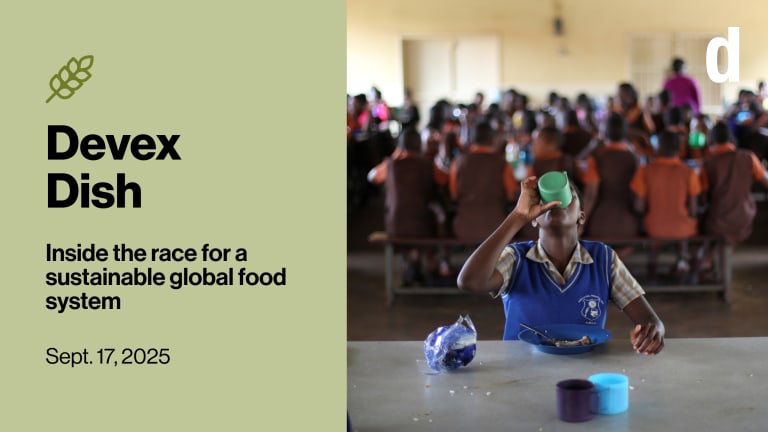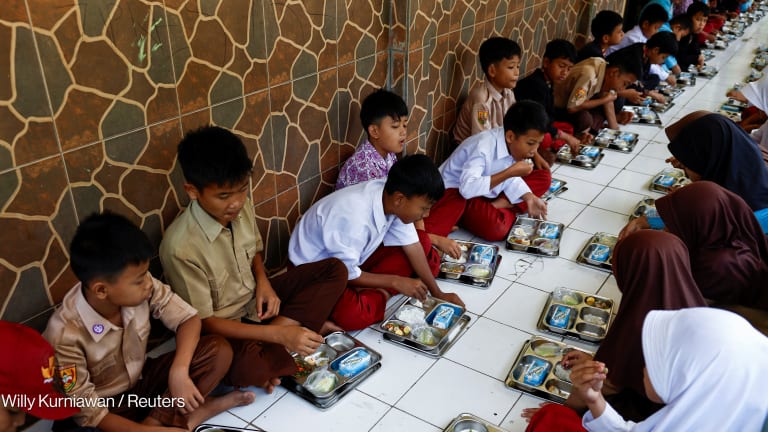
At the 2021 Tokyo Nutrition for Growth Summit, national and global stakeholders made significant new policy and financial commitments to help achieve Sustainable Development Goal 2: Ending hunger and all forms of malnutrition by 2030. For its part, the African Union designated 2022 the Year of Nutrition, sending a powerful signal to its 55 member states to prioritize better nutrition and health for their citizens — especially for children, who are most vulnerable to the effects of malnutrition.
Get the inside track on how agriculture, nutrition, sustainability, and more are intersecting to remake the global food system in this weekly newsletter.
On March 1, the AU marks the 7th African Day of School Feeding to highlight the essential role that school meal programs can and should be playing in this effort. The African Union Development Agency is also releasing new guidelines for member states on the design and implementation of such programs under the homegrown school feeding model, which links school meals to agricultural development by sourcing foods produced by local farming households.
We urge African governments to leverage these guidelines to help ensure that the African continent’s children get the nutritious foods they need to remain healthy and achieve their full potential in school and beyond. The World Food Programme’s “State of School Feeding Worldwide 2020” report shows how school meals are a highly effective strategy for addressing childhood malnutrition, including micronutrient malnutrition, while also improving students' academic performance and attendance rates.
School meals incentivize food-insecure families to send their children to school. For girls, attending school is especially critical to their health and prospects as adolescent girls in Africa who do not attend school are twice as likely to begin early childbearing than those in school.
Unfortunately, the reach of school meals in Africa remains limited. Even before the onset of the COVID-19 pandemic, which led to mass school shutdowns across the continent, only 27% of school children in sub-Saharan Africa received such meals. This was an improvement from 2013, when only 19% did, but as the continent builds better food systems in the wake of COVID-19, we need to restore and accelerate this positive trend.
There is no time to lose, given high rates of childhood undernutrition. Even before the COVID-19 pandemic took hold, an estimated 61 million African children under 5 — 31% of that population — were stunted, and 60% suffered from debilitating anemia.
Beyond this direct human toll, poor childhood nutrition is placing the continent's economic progress at risk. WFP calculates that child undernutrition costs countries in Africa up to 16.5% of their national gross domestic product annually. Conversely, research has shown that efficient school meal programs can produce economic returns of as much as $10 for every dollar invested.
This AU Year of Nutrition provides a unique opportunity to achieve progress and expand the reach and the nutritional quality of Africa's school feeding programs. One proven, cost-effective approach is to serve foods made with nutrient-enriched "biofortified" staple crops. These crops are bred to be rich in micronutrients — notably iron, zinc, or vitamin A — which are essential to children’s health and development.
Nutrient-enriched varieties of maize, sweet potato, beans, cassava, and other crops are already available in several African countries and are currently grown by nearly 8 million African smallholder farming households, according to HarvestPlus estimates. Dozens more varieties are in testing.
Micronutrient deficiency, also called "hidden hunger," leads to high rates of infections and diseases in African children and compromises their physical and mental development. A lack of zinc in the diet contributes to stunting. Iron deficiency is a leading cause of anemia, which leads to pregnancy problems for women, and impaired learning and physical capacity in children.
Vitamin A deficiency is a leading cause of blindness and increases risk to mortality from disease: A study of data from 2013 concluded that vitamin A deficiency was the underlying cause of 18% of the deaths from diarrhea among young children in sub-Saharan Africa.
A robust body of research has shown that, when eaten as a regular part of the diet, biofortified crops and foods provide a significant share of daily micronutrient requirements. The nutrition and health benefits for children are also well documented.
For example, studies have shown that just 125 grams of orange-fleshed sweet potato can meet daily vitamin A requirements. A study in Nigeria showed the benefits of eating vitamin A-enriched cassava for young children. And in a study in India, adolescents who consumed foods made with iron-biofortified pearl millet showed not only improved iron status but also better cognition, memory, and attention levels.
African governments can play a leadership role by integrating biofortified crops and foods in school meals programs and by including biofortification in national agriculture, nutrition, and health policies. A recent example is Tanzania’s new Multisectoral Nutrition Action Plan, which makes biofortification a key intervention for improving nutrition for children as well as adults.
Lifelong good health starts with a solid nutritional foundation during childhood. We can work together to expand the reach and impact of nutritious school meals, to ensure the brightest possible future for Africa’s children.











